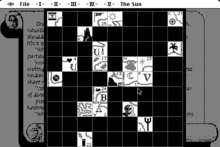The Fool's Errand
| The Fool's Errand | |
|---|---|
|
Macintosh cover art for The Fool's Errand | |
| Developer(s) | Cliff Johnson |
| Publisher(s) | Miles Computing |
| Platform(s) | Mac OS, MS-DOS, Amiga, Atari ST |
| Release date(s) | 1987 |
| Genre(s) | Puzzle |
| Mode(s) | Single-player |
The Fool's Errand is a 1987 computer game by Cliff Johnson. It is a meta-puzzle game with storytelling, visual puzzles and a cryptic treasure map. It is the tale of a wandering Fool who seeks his fortune in the Land of Tarot and braves the enchantments of the High Priestess.
A sequel titled The Fool and His Money was released October 25, 2012.
Release information
The game was originally written for the Apple Macintosh and ported to MS-DOS, Commodore Amiga and Atari ST. The ports add color, but in a lower resolution (320×200, as opposed to the original version's 512×342). Johnson's site advises PC-based players to download the Macintosh version and play using an emulator, specifically mentioning Executor, but other open source emulators will work as well.
The non-Macintosh versions of the game were protected by a symbol-based code wheel. The version offered free of charge given by the author has this mechanism disabled: the challenge screen still appears, but any answer is accepted.
Reception
Computer Gaming World had high praise for the game, saying "You feel like you're matching wits with the author directly, instead of playing 'hunt the parser'"[1] and describing it as "one of the best games I've ever played".[2]
The Fool's Errand won the following awards:
- 1988 MacWorld Game Hall of Fame
- 1989 GAMES Magazine Best Puzzle Game of the Year
Structure
The game is structured as a storybook divided into five parts, each containing a large number of different chapters; the storybook can be paged through and read as continuous prose on screen. However, not every chapter is available at the start of the game, and those chapters which are available are not consecutive. Many chapters have a puzzle (called an enchantment) associated with them; completing such a puzzle unlocks further chapter(s). Every chapter is named after a tarot card in either the Major Arcana or the Minor Arcana.
Frequently, the puzzles are designed in such a way that the result of the puzzle leads logically into the unlocked chapter; for example, the player may complete an acrostic puzzle which results in the phrase "No Ship", which then unlocks part of the story in which a watchperson indeed reports that no ship has been sighted and deals with the consequences. Other puzzles feature pictures which portray parts of the story, or even clues to other puzzles.

The very first chapter, The Sun, features the puzzle The Sun's Map. This is a jigsaw puzzle with one piece for every chapter in the story; each puzzle piece appears only when the appropriate chapter is unlocked. Each piece contains a symbol representing the chapter from which it came, plus part of a continuous path which flows through all pieces in the order in which they are mentioned in the narrative. Once the map is successfully completed, other designs on the map become active click targets and can be used as clues or processes to decipher the true final puzzle: The Book Of Thoth, hidden within the chapter The High Priestess, which requires the reader to peruse the entire story as continuous prose and identify a number of phrases hidden within the narrative.
References
- ↑ Roberts, Alan (Oct 1988), "the fool's errand", Computer Gaming World, p. 18
- ↑ Scorpia (February 1990). "Scorpion's Mail". Computer Gaming World. p. 30. Retrieved 15 November 2013.
External links
- Official Site, with author's information page, including download options
- The Fool's Errand at MobyGames
- The Fool's Errand at Hardcore Gaming 101
- Hints and Answers from Balmoral Software.
.jpg)